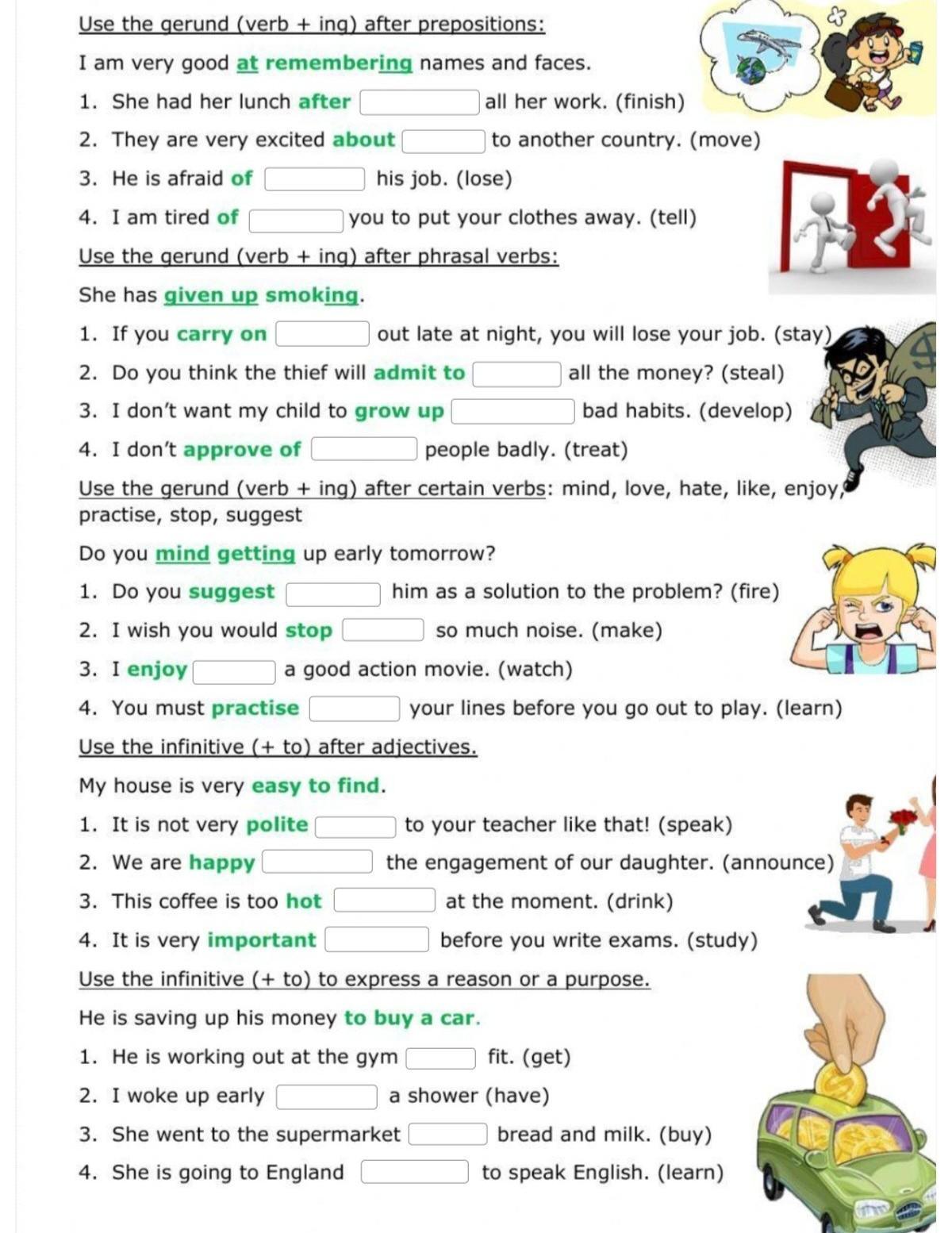-
Use the gerund (verb + ing) after prepositions: I am very good at remembering names and faces. 1. She had her lunch after 2. They are very excited about [ 3. He is afraid of 4. I am tired of Use the gerund (verb + ing) after phrasal verbs: She has given up smoking. 1. If you carry on 2. Do you think the thief will admit to 3. I don't want my child to grow up 4. I don't approve of all her work. (finish) to another country. (move) his job. (lose) you to put your clothes away. (tell) out late at night, you will lose your job. (stay) all the money? (steal) bad habits. (develop) people badly. (treat) Use the gerund (verb + ing) after certain verbs: mind, love, hate, like, enjoy, practise, stop, suggest Do you mind getting up early tomorrow? 1. Do you suggest 2. I wish you would stop him as a solution to the problem? (fire) so much noise. (make) 3. I enjoy 4. You must practise Use the infinitive (+ to) after adjectives. My house is very easy to find. 1. It is not very polite 2. We are happy 3. This coffee is too hot 4. It is very important Use the infinitive (+ to) to express a reason or a purpose. He is saving up his money to buy a car. 1. He is working out at the gym 2. I woke up early 3. She went to the supermarket 4. She is going to England a good action movie. (watch) your lines before you go out to play. (learn) to your teacher like that! (speak) the engagement of our daughter. (announce) at the moment. (drink) before you write exams. (study) fit. (get) a shower (have) bread and milk. (buy) to speak English. (learn)

-
Предмет:
Английский язык -
Автор:
adelaida - 2 года назад
-
Ответы 1
-
Certainly! Here are the sentences with gerunds, infinitives, and the correct forms:
Gerund after prepositions:1. She had her lunch after **eating.**
2. They are very excited about **traveling.**
3. He is afraid of **flying.**
4. I am tired of **working.**
Gerund after phrasal verbs:1. If you carry on, you risk **losing** your job.
2. Do you think the thief will admit to **stealing** all the money?
3. I don't want my child to grow up **developing** bad habits.
4. I don't approve of all her work. I wish you would stop **treating** people badly.
Gerund after certain verbs:1. Do you suggest **firing** him as a solution to the problem?
2. I enjoy **making** so much noise.
3. You must **study** before you write exams.
4. She is going to England to **learn** to speak English.
Infinitive after adjectives:1. It is not very polite **to speak** to your teacher like that!
2. We are happy **to announce** the engagement of our daughter.
3. This coffee is too hot **to drink** at the moment.
4. It is very important **to buy** bread and milk.
Infinitive to express a reason or purpose:1. He is working out at the gym **to stay** fit.
2. I woke up early **to have** a shower.
3. She went to the supermarket **to buy** bread and milk.
4. She is going to England **to learn** to speak English.
-
Автор:
chesterengm - 2 года назад
-
2
-
-
Добавить свой ответ
-
Русский СРОЧНО 8класс
-
Предмет:
Русский язык -
Автор:
darren - 2 года назад
-
Ответов:
1 -
Смотреть
-
- Буть ласка терміново ! Металевий брусок масою 2000 г за температури 100 С опустили в холодну воду масою 500 г за температури 12 С Температура воли підвищилася до 42 С З якої речовини виготовлено брусок ?
-
a=49;a=35;a=63 при a ; 7
b=9;=b=8;b=7 при b : 8
-
Предмет:
Математика -
Автор:
andreas - 2 года назад
-
Ответов:
1 -
Смотреть
-
-
Прочитайте назви професій. Утворіть від кожної назви іменник за допомогою суфікса -ств- і запишіть.
ЗРАЗОК. Бджільник - бджільництво.
Овочівник, хлібороб, ткач, столяр, садівник, лісівник,гончар, кравець, птахівник.
-
Предмет:
Українська мова -
Автор:
kaylie - 2 года назад
-
Ответов:
1 -
Смотреть
-
